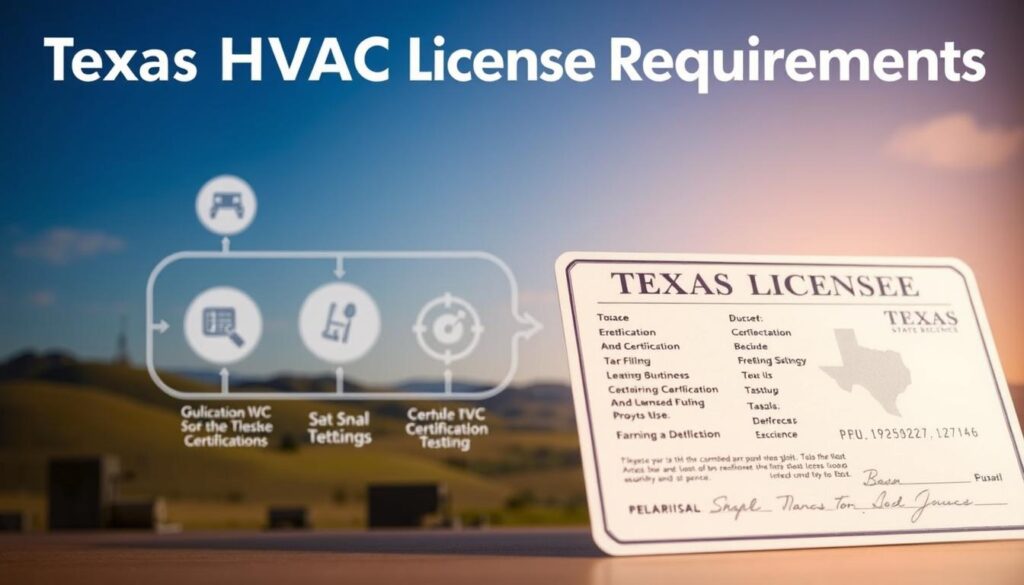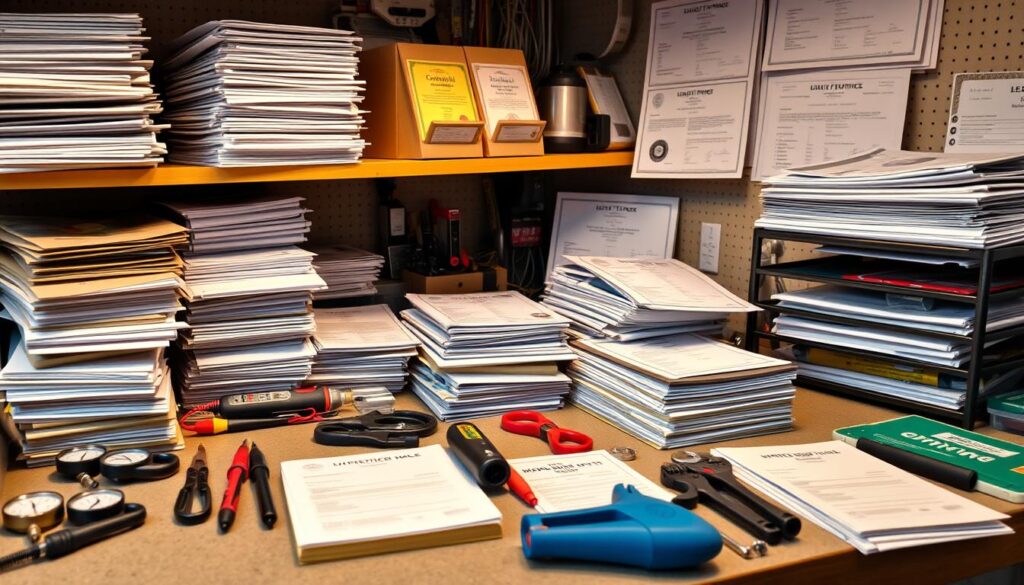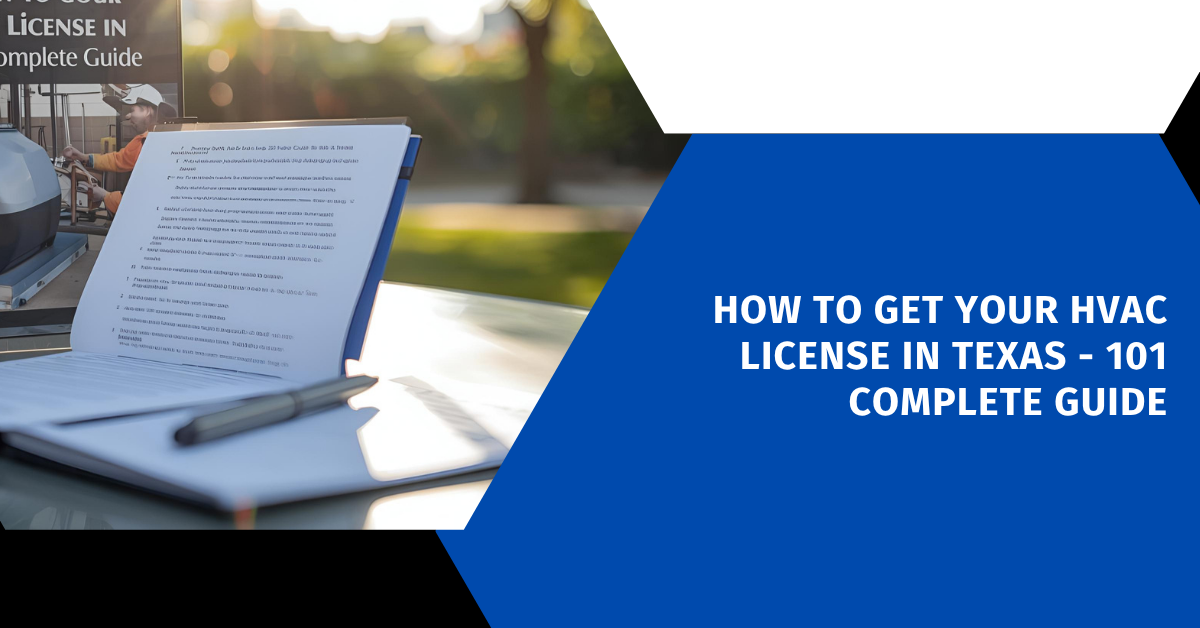Affiliate Disclosure
HVAC Guide Guys is a participant in the Amazon Services LLC Associates Program, an affiliate advertising program designed to provide a means for sites to earn advertising fees by advertising and linking to Amazon.
How to Get Your HVAC License in Texas? Are you ready to start a rewarding career in the heating, ventilation, and air conditioning field? Wondering what it takes to become a licensed HVAC professional in Texas?

The HVAC industry in Texas is booming. With over 31,910 HVAC professionals and a 17% job growth expected, getting your Texas HVAC license could lead to a stable and well-paying career.
Getting your HVAC license in Texas might seem tough, but this guide will help. We’ll cover everything from Texas HVAC license requirements to preparing for your certification. We aim to give you the tools you need to thrive in this exciting field.
Key Takeaways
- Texas offers multiple paths to obtain an HVAC license
- Professional certification requires specific work experience
- Age and educational prerequisites are essential
- EPA certification is crucial for HVAC professionals
- Ongoing training and education enhance career prospects
Table of Contents
Understanding HVAC Licensing Requirements in Texas
Getting into the HVAC field in Texas means knowing the licensing rules. The state has clear rules for those wanting to work in heating, ventilation, and air conditioning.
Before starting your HVAC career in Texas, you must know the basics. These basics will guide your professional path.
Age and Basic Prerequisites
To start your HVAC career in Texas, you need to meet some key criteria:
- Minimum age requirement of 18 years
- High school diploma or equivalent
- Clean criminal background
- Physical ability to perform technical work
State Registration Requirements
Texas has specific rules for HVAC professionals. The state checks your documents to make sure only qualified people work in the field.
| Registration Type | Key Requirements |
|---|---|
| Technician Registration | Proof of training, application, and fees |
| Contractor License | Extensive experience, exam passage, insurance |
Supervision Requirements
Aspiring HVAC professionals need to know about supervision rules in Texas. New technicians work under licensed contractors. This gives them hands-on experience and teaches them industry standards.
- Apprentice technicians must work directly under licensed professionals
- Minimum supervision hours vary by specialization
- Detailed work logs are typically required
Knowing these rules helps you prepare for your HVAC certification in Texas. It sets you up for a successful career in air conditioning and heating.
Explore Our HVAC Shop
Looking for top-rated HVAC tools, parts, and accessories? Visit our shop and find the perfect solution for your needs.
Visit the ShopTypes of HVAC Licenses Available in Texas
Understanding the different HVAC licenses in Texas is key. The Texas Department of Licensing and Regulation oversees these licenses. Your career in HVAC depends on choosing the right license for your goals and skills.
The Texas HVAC licensing system has two main contractor license categories. Each has its own work permissions and restrictions.
Class A License Insights
A Class A HVAC license gives you the most freedom. With it, you can:
- Work on cooling systems of any size
- Handle heating systems with unlimited BTU capacity
- Execute complex commercial and residential HVAC installations
Class B License Specifications
The Class B license has a more limited scope. It’s for professionals who work on:
- Restricted to cooling systems up to 25 tons
- Heating system work limited to 1.5 million BTUs/hour
- Ideal for smaller-scale residential and light commercial projects
Available Endorsements
HVAC professionals can get specialized endorsements. These include:
- Environmental Air Conditioning – Focused on eco-friendly cooling systems
- Commercial Refrigeration – Specialized in complex refrigeration infrastructure
- Process Cooling or Heating – Advanced industrial temperature control systems
Choosing the right license and endorsement is crucial. It will help you reach your full potential in the Texas HVAC industry.
How to Get Your HVAC License in Texas
Getting an HVAC license in Texas means going through several important steps. Your path to becoming a licensed HVAC pro has many key stages. These steps need your focus and dedication.
- Register with the Texas Department of Licensing and Regulation (TDLR)
- Gain supervised work experience under a licensed HVAC contractor
- Complete required educational training
- Prepare for and pass the state HVAC licensing examination
- Submit your formal application for licensing
The HVAC license process in Texas checks your technical skills and meets state rules. Each step is vital to show your professional skills.
| Requirement | Details |
|---|---|
| Minimum Age | 18 years old |
| Work Experience | 4-5 years under licensed contractor |
| Exam Preparation | Technical knowledge and practical skills assessment |
When it’s time for HVAC license renewal in Texas, remember to keep learning and apply on time. Keep track of your license to keep working without pause.
Dedication and systematic preparation are key to successfully navigating the Texas HVAC licensing process.
By following these steps, you’ll be well on your way to a successful HVAC career in Texas.
Explore Our HVAC Shop
Looking for top-rated HVAC tools, parts, and accessories? Visit our shop and find the perfect solution for your needs.
Visit the ShopRequired Work Experience and Documentation
To get an HVAC license in Texas, you must show you’ve worked in the field for a while. The texas state board of plumbing examiners has rules for your work history and documents. These rules are clear for those wanting to be HVAC pros.

Experience Verification Process
To apply for a tdlr hvac license, you must document your work experience well. The state has specific rules for verifying your experience:
- At least 48 months of work in air-conditioning and refrigeration
- Work must be under a licensed contractor
- Work must be done in the last 72 months
Alternative Experience Pathways
Texas has different ways for HVAC license candidates to show their skills:
- Certification Option: Have Texas ACR Technician Certification for 12 months
- Or, 36 months of experience under a licensed contractor
- Experience in the last 48 months
Documentation Requirements
It’s important to prepare your documents well for your license application. You’ll need to fill out an Experience Verification Form. This form should include:
- Employer details
- Employment dates
- Job duties
- Verification from your supervisor
Pro tip: Keep detailed records of your work history to make the application easier.
HVAC Education and Training Programs in Texas
Starting a career in HVAC needs solid education and training. Texas has many ways to get your hvac certification in texas. You can choose from different programs that match your learning style and budget.
When you’re looking at getting your texas air conditioning contractor license, you have several options. Here are a few:
- Technical Schools
- Community Colleges
- Vocational Training Centers
- Apprenticeship Programs
Program costs vary a lot, from $1,200 to $15,000. Your cost depends on the program and school you pick.
| Program Type | Duration | Estimated Cost |
|---|---|---|
| Technical School Certificate | 6-12 months | $1,200 – $5,000 |
| Associate’s Degree | 2 years | $10,000 – $15,000 |
| Apprenticeship | 3-5 years | Minimal cost/Paid training |
Make sure the programs you choose are accredited. Look for ones recognized by HVAC Excellence and PAHRA. These groups ensure your education meets professional standards.
Explore Our HVAC Shop
Looking for top-rated HVAC tools, parts, and accessories? Visit our shop and find the perfect solution for your needs.
Visit the ShopTexas HVAC Licensing Exam Details and Preparation
Getting your ace class a license in Texas means you must know the licensing exam well. This exam is key to getting your HVAC license. It tests your knowledge and skills in HVAC.

The exam changes based on the license you want. Both Class A and Class B exams need a lot of study and planning.
Exam Structure and Content
Your HVAC licensing exam will test you on several important topics:
- Boller systems
- Business and legal rules
- HVAC system design
- Refrigeration basics
- Safety rules
Exam Comparison
| License Type | Questions | Time Limit | Passing Score |
|---|---|---|---|
| Class A License | 120 questions | 4 hours | 70% |
| Class B License | 100 questions | 3 hours | 70% |
Study Resources
To do well, use good study materials:
- Official Texas HVAC licensing study guide
- Practice exams
- Online training courses
- Professional HVAC training workshops
Testing Locations
Exam spots are in big Texas cities like Houston, Dallas, Austin, and San Antonio. Look up the official Texas licensing board website for where to take the exam and when.
Pro tip: Take your exam when it’s not too busy. Arrive early to make the test day less stressful.
Insurance and Legal Requirements
Getting a texas air conditioning contractor license means you need to know about insurance and legal rules. These are key to protect your business and follow the Texas Department of Licensing and Regulation HVAC rules.
As an HVAC pro, you must have commercial general liability insurance to work legally in Texas. This insurance helps cover financial losses from property damage or injuries while working.
- Minimum insurance coverage varies by license class
- Insurance must be from a Texas-authorized provider
- Continuous coverage is mandatory while your license remains active
Your insurance policy should cover:
- Property damage protection
- Bodily injury coverage
- Completed operations liability
The Texas Department of Licensing and Regulation needs proof of insurance when you apply for a license. Not having the right insurance can lead to your license being suspended or taken away.
Protecting your business starts with understanding and meeting all legal insurance requirements.
Contractors must check their specific license class needs to follow state rules.
EPA Certification and Additional Credentials
Getting the right certifications in Texas can really help your HVAC career. You need specific credentials to show you’re an expert and follow industry rules.
EPA certification is key for HVAC techs working with refrigeration. The Environmental Protection Agency requires it to keep the environment safe and ensure techs are skilled.
EPA 608 Certification Types
The EPA 608 certification has four types:
- Type I: Small appliances like window ACs and refrigerators
- Type II: High-pressure and medium-pressure systems
- Type III: Low-pressure refrigeration equipment
- Universal: Covers all refrigeration and air conditioning systems
Professional Certifications for HVAC Technicians
There are more certifications than EPA for HVAC techs in Texas:
| Certification | Issuing Organization | Focus Area |
|---|---|---|
| NATE Certification | North American Technician Excellence | Technical Expertise |
| ASHRAE Certification | American Society of Heating | Advanced HVAC Systems |
| HVAC Excellence | Professional Certification | Comprehensive Skills |
“Continuous learning and certification are the keys to success in the HVAC industry.” – HVAC Professional Association
Getting these certifications can lead to better job opportunities and higher pay in Texas’s HVAC market.
Explore Our HVAC Shop
Looking for top-rated HVAC tools, parts, and accessories? Visit our shop and find the perfect solution for your needs.
Visit the ShopHVAC Career Opportunities and Salary Expectations in Texas
Getting an hvac technician license in Texas opens up many exciting career paths. The HVAC industry in Texas is growing fast. It offers great opportunities for skilled professionals who meet the requirements.
The job market for HVAC technicians in Texas is strong. There are many career options in residential, commercial, and industrial sectors. You can work in small local businesses or big industrial complexes.
“Your HVAC license is your passport to a stable and rewarding career in Texas.” – Industry Expert
Here are the main career options for licensed HVAC professionals:
- Residential HVAC Technician
- Commercial HVAC Specialist
- Industrial Maintenance Technician
- HVAC Systems Designer
- Energy Efficiency Consultant
Salaries vary based on experience and specialization. Here are the current salary ranges for HVAC professionals in Texas:
| Experience Level | Annual Salary Range |
|---|---|
| Entry-Level Technician | $35,000 – $45,000 |
| Experienced Technician | $50,000 – $65,000 |
| Senior HVAC Specialist | $65,000 – $80,000 |
The U.S. Bureau of Labor Statistics says HVAC professionals in Texas make an average annual salary of $54,640. With the right training and certification, you can earn more in this fast-paced field.
Conclusion
Getting your HVAC license in Texas is a big step in your career. It takes hard work, training, and meeting state rules. Knowing how to get your license helps you start your journey in this exciting field.
Learning to get your HVAC license in Texas means several important steps. You need to finish educational programs, get work experience, pass exams, and keep learning. Investing in your skills and credentials opens up more job chances and higher pay in Texas.
Renewing your license in Texas is also key. You must keep up with industry changes, take more classes, and update your certifications. Renewing your license keeps you competitive and lets you serve clients well in Texas.
As you grow in your HVAC career, always keep learning and improving. Look for chances to get better at your job, connect with others in the field, and learn about new tech. Your hard work and commitment will make you stand out in Texas’s HVAC industry.
FAQ
How old do I need to be to get an HVAC license in Texas?
What are the different types of HVAC licenses available in Texas?
How long does it take to get an HVAC license in Texas?
What education do I need to become an HVAC technician in Texas?
Do I need EPA certification to work as an HVAC technician in Texas?
How much does it cost to get an HVAC license in Texas?
How old do I need to be to get an HVAC license in Texas?
What are the different types of HVAC licenses available in Texas?
How long does it take to get an HVAC license in Texas?
What education do I need to become an HVAC technician in Texas?
Do I need EPA certification to work as an HVAC technician in Texas?
How much does it cost to get an HVAC license in Texas?
FAQ
How old do I need to be to get an HVAC license in Texas?
You must be at least 18 years old to get an HVAC license in Texas. This is a basic rule for starting in the HVAC field in the state.
What are the different types of HVAC licenses available in Texas?
Texas has two main HVAC licenses: Class A and Class B. There are also three endorsements: Environmental Air Conditioning, Commercial Refrigeration, and Process Cooling or Heating. Each has its own work scope and requirements.
How long does it take to get an HVAC license in Texas?
The time it takes varies based on your experience and education. You’ll need to complete 2-4 years of work experience, get necessary certifications, and pass the state exam. The whole process can take 2-5 years.
What education do I need to become an HVAC technician in Texas?
While not always needed, most employers want a technical diploma or associate degree in HVAC technology. Texas’s community colleges and technical schools offer great HVAC training programs to prepare you for licensing.
Do I need EPA certification to work as an HVAC technician in Texas?
Yes, you need EPA 608 Certification to work with refrigerants. There are four certifications (Type I, II, III, and Universal). Choose the right one for your job.
How much does it cost to get an HVAC license in Texas?
Costs include training (from
FAQ
How old do I need to be to get an HVAC license in Texas?
You must be at least 18 years old to get an HVAC license in Texas. This is a basic rule for starting in the HVAC field in the state.
What are the different types of HVAC licenses available in Texas?
Texas has two main HVAC licenses: Class A and Class B. There are also three endorsements: Environmental Air Conditioning, Commercial Refrigeration, and Process Cooling or Heating. Each has its own work scope and requirements.
How long does it take to get an HVAC license in Texas?
The time it takes varies based on your experience and education. You’ll need to complete 2-4 years of work experience, get necessary certifications, and pass the state exam. The whole process can take 2-5 years.
What education do I need to become an HVAC technician in Texas?
While not always needed, most employers want a technical diploma or associate degree in HVAC technology. Texas’s community colleges and technical schools offer great HVAC training programs to prepare you for licensing.
Do I need EPA certification to work as an HVAC technician in Texas?
Yes, you need EPA 608 Certification to work with refrigerants. There are four certifications (Type I, II, III, and Universal). Choose the right one for your job.
How much does it cost to get an HVAC license in Texas?
Costs include training (from $1,000 to $15,000), exam fees (about $50-$200), and licensing fees from the Texas Department of Licensing and Regulation. Don’t forget to budget for study materials and certification costs.
What is the average salary for licensed HVAC technicians in Texas?
Licensed HVAC technicians in Texas can earn between $45,000 and $75,000 a year. Salary depends on experience, specialization, and location.
How often do I need to renew my HVAC license in Texas?
HVAC licenses in Texas need renewal every two years. You must complete continuing education and pay the renewal fee to keep your license active.
Can I transfer my HVAC license from another state to Texas?
Texas doesn’t have a direct license transfer process. You’ll need to meet Texas’s specific requirements, including passing the state exam and showing work experience.
What insurance do I need as a licensed HVAC contractor in Texas?
You need to have minimum insurance coverage, which differs between Class A and Class B licenses. This usually includes general liability insurance. You might also need extra coverage for property damage and bodily injury.
,000 to ,000), exam fees (about -0), and licensing fees from the Texas Department of Licensing and Regulation. Don’t forget to budget for study materials and certification costs.
What is the average salary for licensed HVAC technicians in Texas?
Licensed HVAC technicians in Texas can earn between ,000 and ,000 a year. Salary depends on experience, specialization, and location.
How often do I need to renew my HVAC license in Texas?
HVAC licenses in Texas need renewal every two years. You must complete continuing education and pay the renewal fee to keep your license active.
Can I transfer my HVAC license from another state to Texas?
Texas doesn’t have a direct license transfer process. You’ll need to meet Texas’s specific requirements, including passing the state exam and showing work experience.
What insurance do I need as a licensed HVAC contractor in Texas?
You need to have minimum insurance coverage, which differs between Class A and Class B licenses. This usually includes general liability insurance. You might also need extra coverage for property damage and bodily injury.

